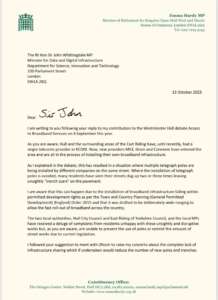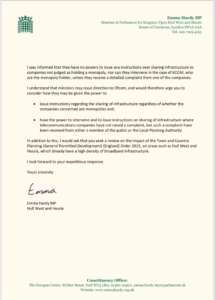Many constituents have contacted me raising concerns as a result of new telecommunication companies installing infrastructure in their local area, with minimal prior notification and no consultation with residents. Such works appear to have accelerated in recent months, with many areas in Hull West and Hessle subject to them. The use of telegraph poles has also become commonplace, resulting in streets with numerous telegraph poles installed by different providers or areas that have previously only had underground infrastructure seeing the installation of telegraph poles. Even when the use of telegraph poles is avoided and works to install new infrastructure is underground, many residents have seen their streets dug up 2-3 times with unsightly “trench scars” and markings left on the pavement.
I found out that this is because telecoms network operators are ‘statutory undertakers’ for the purpose of the New Roads and Street Works Act 1991 (‘the NRSWA’). This means that, like utilities companies, they have a general right to install infrastructure on or under public roads and to carry out associated street works. The NRSWA requires that undertakers notify the relevant highway authority, such as Hull City Council or East Riding of Yorkshire Council of planned works on public roads, but they do not need its consent.
Concerning telegraph poles, I now understand that telegraph poles do not need planning permission under the Electronic Communications Code (Conditions and Restrictions) 2003 and The Town and Country Planning (General Permitted Development) (England) Order 2015 and the only requirement on the operator is 28 days’ notice to the Local Planning Authority (LPA) who can only make suggestions on siting which the telecoms company is under no obligation to follow. There is no requirement to inform residents of the work prior to installation.
I have been advised that when the new legislation/planning rules concerning telecoms infrastructure was introduced, it was made deliberately broad to ensure that broadband infrastructure could be installed quickly to enable rural areas, without existing infrastructure to reap the benefits of new and/or improved access to broadband without delay. It seems to be an unfortunate consequence of this deliberately broad legislation that the city of Hull and Hessle is seeing an increased number of providers installing their infrastructure with a view to offering an alternative to KCOM
I want you to know that I share all of your concerns.
Initially, I did some research to find out how it is possible for works of these type to take place without the need to conduct a consultation or obtain permission from local authority planning departments and/or residents.
It was Conservative/Liberal Democrat Coalition government policy to remove ‘red tape’ associated with installing communications infrastructure in a bid to facilitate high-speed broadband across the country.
https://www.gov.uk/government/news/fastest-broadband-in-europe-delivering-infrastructure-to-boost-uk-businesses–2
In relation to this, the government has recently said that “most telecoms infrastructure, including telegraph poles, masts and base stations, is subject to nationally set permitted development rights. Permitted development rights enable certain types of development to be undertaken without the need for planning permission, where the need to apply for permission would be out of proportion with the impacts of development. The prior approval of the local planning authority is still required for the installation of some telecoms infrastructure, such as new masts”
I believe that this indicates that there no plans to amend the legislation to exclude underground cabling and/or telegraph poles from permitted development rights but please be assured that I will continue to press the government on this matter.
In the meantime, I have undertaken a number of actions to try and prevent my constituency being blighted by the constant works taking place to install underground and overhead infrastructure.
I have met with new telecoms providers and asked them to cease works in Hessle, or to at least consider using underground cabling instead of telegraph poles but was advised that it was their intention to continue with their business plans unamended despite outcry from residents.
I have liaised with both Hull City Council and East Riding of Yorkshire Council. I understand that they are deluged with complaints from local residents but, again as the current legislation provides for telecommunications being able to install infrastructure without any permission, they are also powerless to stop the works from taking place.
I have since met with Ofcom, which is the communications regulator in the UK, to raise concerns raise my concerns about the current position in relation to the deployment of telegraph poles in Hull West and Hessle and the lack of resource sharing between providers meaning that infrastructure can be installed by multiple different providers in the same area.
We discussed the alleged lack of infrastructure sharing by KCOM, I was informed that Ofcom need a formal complaint from one of the new companies to investigate obstacles preventing the economically viable sharing of KCOM’s existing poles and ducting. I understand that they have no powers to issue instructions to new providers over sharing infrastructure as they are not existing monopolies.
In the first instance, Ofcom confirmed that they are looking to arrange a meeting with all service providers, such as KCOM, MS3, Grain and Connexin, to see if a joint resolution can be sought. I requested a further meeting with Ofcom in a month’s time for an update on their progress, which they agreed to.
Regretfully, at this time, it seems the telecommunication companies are acting within current legislation. Even where they may have neglected the Code of Practice, that does not ultimately prevent them from undertaking the work.
Unfortunately this issue isn’t a simple fix and requires a change in the law by the government to ensure that approval must be sought by telecommunications providers before commencing these works. I will of course continue to lobby the government to compel them to change their stance on this matter.
I have been made aware that the telecommunication companies in working in Hull West and Hessle, will consider resident’s legitimate concerns about the citing of a telegraph pole, such as when it would cause an access issue or when an application for a dropped kerb has been submitted but the works have not yet taken place. If you have this type of concern, I would suggest that you contact the company directly or my office on emma.hardy.mp@parliament.uk and I will be happy to raise the concerns on your behalf.





